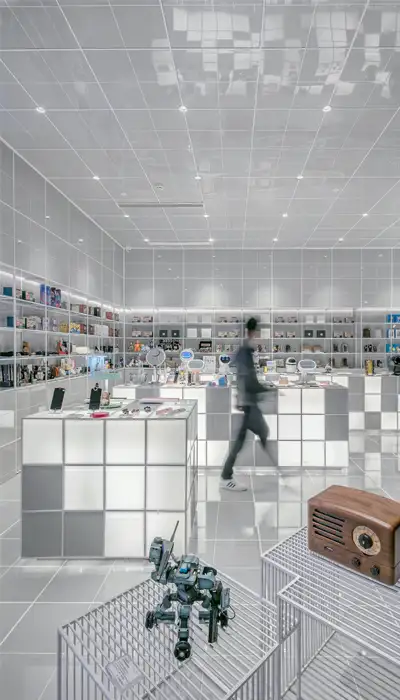AI in Retail: 09 Benefits and Use Cases You Need to Know
Artificial intelligence (AI) is
transforming the retail industry by enabling retailers to optimize customer
experiences, forecasting, inventory management, and more. AI can help retailers
gain a competitive edge and increase their sales and profitability.
AI is the ability of machines or
systems to perform tasks that normally require human intelligence, such as
perception, reasoning, learning, decision making, and problem solving. AI can
be applied to various aspects of retail, such as marketing, merchandising,
operations, customer service, and analytics.

Here are nine examples of how AI in Retail is transforming the retail industry:
1. Personalized recommendations
AI can help retailers provide personalized recommendations to customers based on their preferences, behavior, and purchase history. By using AI algorithms and data analysis, retailers can create tailored offers and suggestions that match customer needs and interests.
For example, Amazon uses AI to recommend products that customers might like based on their browsing and buying patterns. Netflix uses AI to suggest movies and shows that customers might enjoy based on their viewing history and ratings.
2. Voice-enabled shopping assistants
AI can help retailers create voice-enabled shopping assistants that can interact with customers through natural language processing (NLP) and speech recognition. By using AI-powered devices such as smart speakers or smartphones, customers can ask questions, place orders, or get information using voice commands.
For example, Walmart partnered with Google to enable customers to shop for groceries using Google Assistant. Customers can add items to their online cart by saying “Hey Google, talk to Walmart” and then speaking their grocery list.
3. Facial recognition payment methods
AI can help retailers create facial recognition payment methods that can authenticate customers and process transactions without the need for cards or cash. By using AI-powered cameras and biometric technology, customers can pay for their purchases by scanning their faces at checkout.
For example, Alibaba launched a facial recognition payment system called Smile to Pay in China. Customers can pay for their orders at KFC outlets by smiling at a self-service kiosk that verifies their identity and deducts the amount from their Alipay account.
4. Robotic warehouse pickers
AI can help retailers create robotic warehouse pickers that can automate the process of picking and packing orders in warehouses. By using AI-powered robots and sensors, retailers can reduce labor costs, increase efficiency, and improve accuracy.
For example, Ocado uses AI to operate a robotic warehouse in the UK. The warehouse has over 1,000 robots that move around on a grid system and pick up crates containing products. The robots are controlled by an AI system that optimizes their movements and routes.
5. Ai in Retail : Anti-counterfeit tools
AI can help retailers create anti-counterfeit tools that can detect and prevent the sale of fake or counterfeit products. By using AI-powered image recognition and blockchain technology, retailers can verify the authenticity and origin of products and protect their brand reputation.
For example, LVMH partnered with Microsoft and ConsenSys to create a blockchain platform called Aura that uses AI to track luxury products throughout their lifecycle. Customers can scan a QR code or NFC chip on the product to access its history and proof of authenticity.

6. Customer service chatbots
AI can help retailers create customer service chatbots that can provide instant and automated responses to customer queries or complaints. By using AI-powered natural language understanding (NLU) and natural language generation (NLG), chatbots can understand customer intents and generate appropriate replies.
For example, H&M uses an AI chatbot on its website and app that helps customers find products, get styling tips, or access customer support. The chatbot also learns from customer feedback and improves its performance over time.
7. Inventory management
AI can help retailers create inventory management systems that can optimize inventory levels, reduce waste, and prevent stockouts. By using AI-powered demand forecasting and machine learning models, retailers can predict customer demand and adjust inventory accordingly.
For example, Walmart uses an AI system called Intelligent Retail Lab (IRL) that monitors inventory levels in real time using cameras and sensors. The system alerts store associates when items need to be restocked or when shelves need to be cleaned.
8. Dynamic pricing
AI can help retailers create dynamic pricing systems that can adjust prices based on real-time data such as demand, supply, competition, seasonality, or customer behavior. By using AI-powered algorithms and data analysis, retailers can optimize their pricing strategies and maximize their profits.
For example, Uber uses an AI system called surge pricing that increases or decreases the price of rides based on the demand and supply of drivers and passengers. The system aims to balance the market and incentivize drivers and passengers.
9. Customer intelligence
AI can help retailers create customer intelligence systems that can analyze customer data and provide insights into customer behavior, preferences, needs, and satisfaction. By using AI-powered data mining and analytics, retailers can understand their customers better and improve their marketing and sales performance.
For example, Starbucks uses an AI system called Deep Brew that analyzes customer data from various sources such as loyalty programs, mobile apps, or social media. The system helps Starbucks personalize offers, optimize menus, and enhance customer experiences.
These are some of the ways AI is used in retail industry. AI can help retailers improve their efficiency, productivity, quality, and customer satisfaction. AI can also help retailers gain a competitive advantage and stay ahead of the market trends and innovations.
Conclusion
AI is a powerful tool that can help retailers enhance their performance and customer satisfaction. By using AI in various aspects of retail, such as personalized recommendations, voice-enabled shopping assistants, facial recognition payment methods, robotic warehouse pickers, anti-counterfeit tools, customer service chatbots, inventory management, dynamic pricing, and customer intelligence, retailers can gain a competitive edge and increase their sales and profitability. AI can also help retailers adapt to the changing market trends and customer expectations. If you want to learn more about how AI can benefit your retail business, contact us today. We are a team of experts who can help you implement AI solutions that suit your needs and goals. Don’t miss this opportunity to take your retail business to the next level.
Are you interested in using AI for your retail business? We would love to hear from you and help you out. Contact us today and get a free consultation and quote. Whether you want to improve your customer experience, optimize your inventory management, or increase your sales and profitability. Contact us now and let’s get started!
Read our Insightful articles
We help you with insightful strategy, marketing, sales, and business related articles, and industry trends, click below to learn more..
